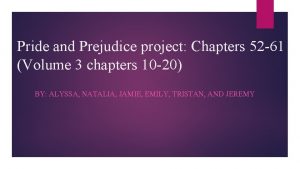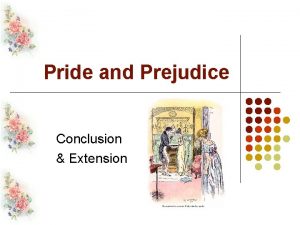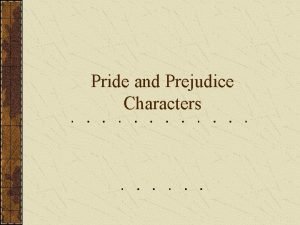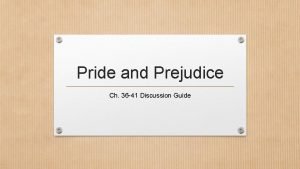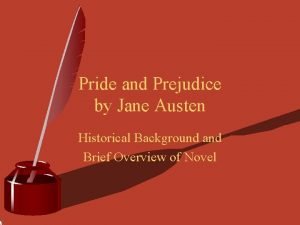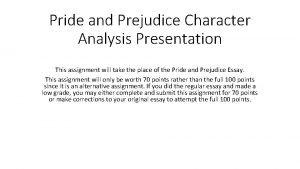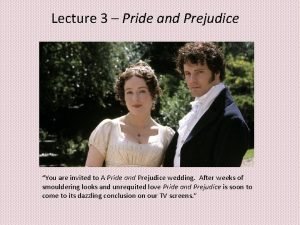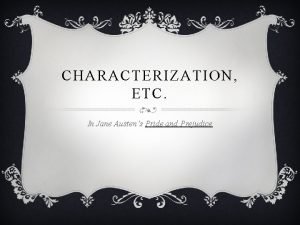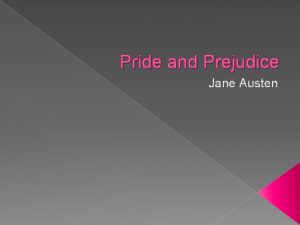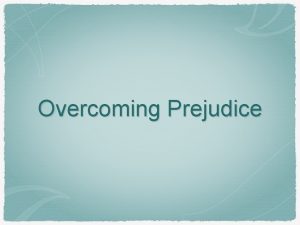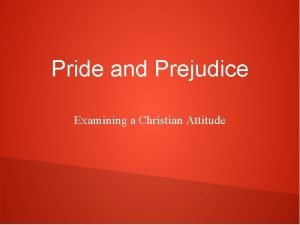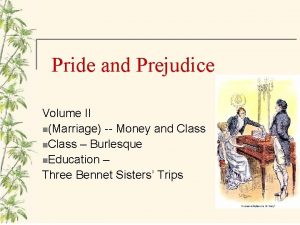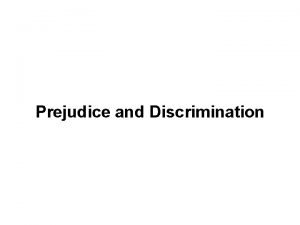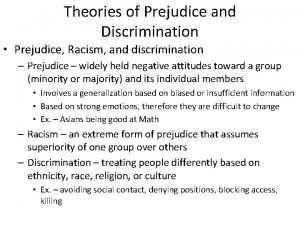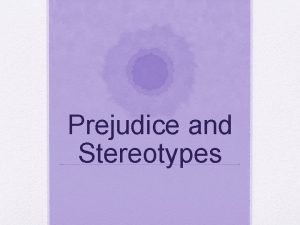Pride and Prejudice Money and Status How much














- Slides: 14

Pride and Prejudice Money and Status

How much a year? • • • Today: A rude question Usually salary Implies buying power The higher a salary, the higher the status of the occupation • Austen’s time • A necessary question • Inherited not earned wealth • Rank • Social aspirations • Buying power • Gentility (no need to work)

What is meant by “a year”? • Man: • His worth was expressed in the amount of interest his actual wealth made per year at 4 -5% • Bingley’s 4 -5, 000 pounds a year is the interest on 100, 000 pounds (too bad it comes from “trade”) • Woman: • Her amount is equal to her actual total worth • Women like Elizabeth will receive their inherited money when they marry

What money buys in P&P Gentility’s necessities Servants Carriages Houses

Servants • Servants = “modern conveniences” like hot water, washing machines, etc. Add a servant, add a convenience • The higher your income, the more servants you can afford • Hence, Mrs. Bennet’s insulted response when Collins asks her which daughter cooked the dinner

Transportation • The higher your income, the better your mode of transportation will be • The higher your income, the more carriages you could afford • When Lady Catherine asks Elizabeth what carriage her father keeps, she’s asking, “What car do you drive? ” • Darcy doesn’t speak to Mrs. Long at the Meryton ball because she comes in a hired carriage

Houses • Houses were valuable inheritances—the Bennet house, Longbourn, will go to Mr. Collins because of an entailment • Estates like Pemberly, Netherfield, and Rosings required large staffs • One house is nice, but two are better; the truly well-to-do can afford a 2 nd home in London. However, the Gardeners live in Cheapside, an unfashionable part of London.

Barely Genteel • 100 pounds per year • One servant of “all works” • Poverty level • Elizabeth’s 1, 000 pounds per year would yield only 40 -50 pounds a year

• 200 pounds a year • Maid of all work—a better class of servant • Still relatively impoverished

400 -500 a year: a cook, 2 servants; still no carriage—but an almost comfortable income

700 -1, 000 a year—income of the most prosperous professional classes

2, 000 pounds per year (Mr. Bennet’s income): a cook, several housemaids, male servants, gardener, groom, coachman, but tough for a family of 7

4, 000 pounds and above: a house in London for the “season”; numerous servants and vehicles; Darcy has 10, 000 pounds a year and 26 servants

A final thought: “Single women have a dreadful propensity for being poor—which is one very strong argument in favour of matrimony. ” --Jane Austen 1816
 Pride and prejudice irony
Pride and prejudice irony Location of pride and prejudice
Location of pride and prejudice Volume 2 pride and prejudice
Volume 2 pride and prejudice Pride and prejudice chapter 18 summary
Pride and prejudice chapter 18 summary Pride and prejudice chapter 16 summary
Pride and prejudice chapter 16 summary Pride and prejudice outline
Pride and prejudice outline Who is miss lucas's daughter in pride and prejudice?
Who is miss lucas's daughter in pride and prejudice? Pride and prejudice chapter 36
Pride and prejudice chapter 36 Historical background of pride and prejudice
Historical background of pride and prejudice Pride and prejudice chapter 49 summary
Pride and prejudice chapter 49 summary Pride and prejudice chapter 56
Pride and prejudice chapter 56 Pride and prejudice character analysis essay
Pride and prejudice character analysis essay Manners in pride and prejudice
Manners in pride and prejudice Catherine belsey books
Catherine belsey books Indirect characterization in pride and prejudice
Indirect characterization in pride and prejudice




